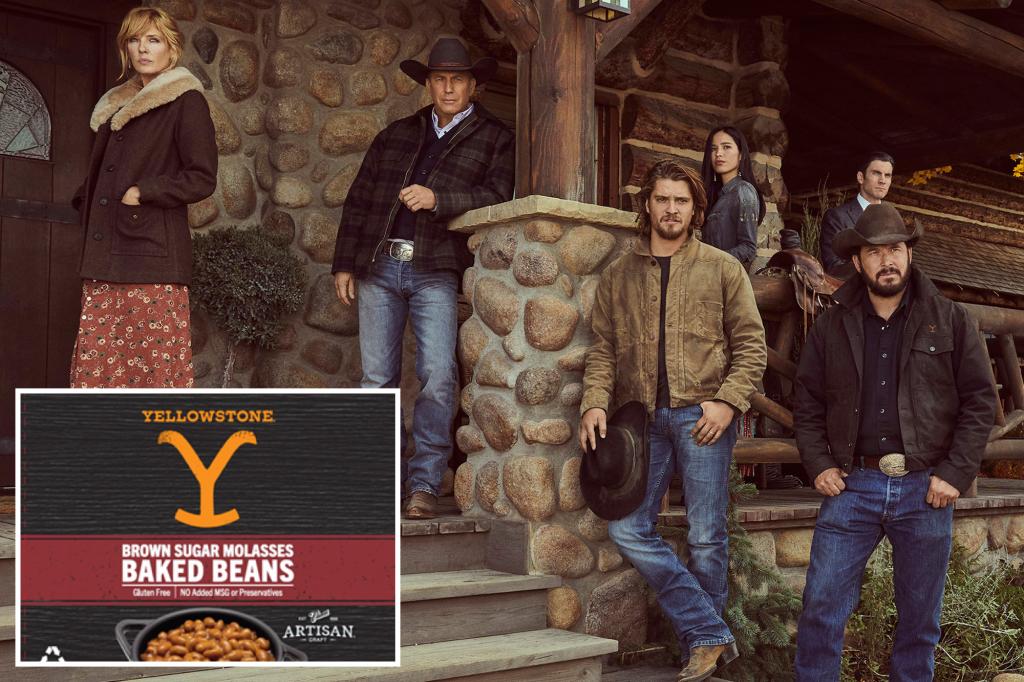## Giddyup and Get Ready to Ditch Those Beans: “Yellowstone”-Inspired Treats Recalled for Hidden Danger
Remember those delicious baked beans, the ones that promised a taste of the “Yellowstone” lifestyle? The ones you envisioned devouring while watching Dutton family drama unfold on screen? Well, hold your horses – those beans might be more trouble than they’re worth. A recent recall has thrown a wrench into our ranch-to-table fantasies, revealing a hidden danger that could leave fans with more than just a tummy ache.

Beyond the Bean: Navigating Food Safety in the Age of Fandom
Exploring the “Yellowstone” Brand Tie-In: Marketing Strategy and Target Audience
The recent recall of “Yellowstone” Brown Sugar Molasses Baked Beans by Vietti Food Group highlights the increasingly blurred lines between entertainment and consumer products. The “Yellowstone” brand, built on the success of the hit Paramount Network series, has capitalized on the show’s widespread popularity to extend its reach beyond the screen and into the pantry. This strategy, common in the world of pop culture licensing, aims to tap into the passionate fanbase of the show, creating a sense of connection and exclusivity for consumers.
The target audience for these products is likely multifaceted. It includes die-hard fans of “Yellowstone” who seek tangible reminders of the show’s characters, storylines, and atmosphere. Moreover, the brand tie-in likely appeals to a broader demographic of consumers who appreciate the “Yellowstone” aesthetic and the appeal of seemingly authentic, rustic Americana.
The Appeal of Pop Culture Licensed Products: Consumer Psychology and the Allure of Fandom
The allure of pop culture licensed products stems from a deep-seated human desire for connection and belonging. Fandom provides a sense of community and shared identity, and licensed merchandise serves as a tangible representation of this affiliation. Owning a product associated with a beloved TV show, movie, or character allows fans to express their allegiance and feel closer to the world they cherish.
From a psychological perspective, these products tap into our emotional responses to narratives and characters. We identify with heroes, root for their victories, and mourn their losses. Licensed merchandise becomes a way to extend these emotional connections beyond the screen, allowing fans to actively engage with the narrative and carry a piece of it with them.
The Potential for Brand Damage: Impact on Consumer Trust and Future Sales
While brand tie-ins can be highly successful, they also carry inherent risks. The recent recall of the “Yellowstone” baked beans serves as a stark reminder of the potential for damage to brand reputation and consumer trust when safety standards are compromised.
A food safety recall can have a devastating impact on a brand’s image. Consumers may perceive the brand as careless or negligent, leading to a loss of confidence in their products. This can result in a decline in sales, as consumers choose to avoid the brand altogether.
In the case of the “Yellowstone” brand, the recall could potentially tarnish the association between the show and its associated products. While the show itself remains unaffected, the negative publicity surrounding the recall may create a sense of unease among fans, potentially impacting their willingness to purchase future licensed merchandise.
Manufacturer Responsibility: Vietti Food Group’s Role and Potential for Improved Oversight
As the manufacturer of the recalled product, Vietti Food Group bears significant responsibility for ensuring the safety of its goods. The presence of undeclared soy in the baked beans indicates a lapse in quality control procedures. Thorough ingredient checks, rigorous testing protocols, and effective communication channels with suppliers are crucial for preventing such incidents.
Following the recall, Vietti Food Group must conduct a thorough internal review to identify the root cause of the problem and implement corrective measures to prevent future occurrences. This may include strengthening internal controls, improving staff training, and enhancing supplier verification processes.
Transparency and accountability are essential for rebuilding consumer trust. Vietti Food Group should provide clear and concise explanations to consumers about the recall, the cause, and the steps being taken to address the issue. Proactive communication can help mitigate reputational damage and demonstrate a commitment to food safety.
The FDA’s Role: Enforcement Actions and Consumer Protection Measures
The US Food and Drug Administration (FDA) plays a vital role in ensuring the safety of the food supply chain. In the case of the “Yellowstone” baked bean recall, the FDA issued a public announcement detailing the affected product, the reason for the recall, and the recommended course of action for consumers.
The FDA’s enforcement actions against Vietti Food Group may include fines, product seizures, and even the suspension of the company’s manufacturing license, depending on the severity of the violation. These measures aim to deter future occurrences and protect public health.
Furthermore, the FDA continuously works to enhance consumer protection measures by implementing stricter regulations, conducting targeted inspections, and providing educational resources to the public. Consumers can access information about food recalls, safety tips, and reporting procedures on the FDA’s website.
Lessons Learned: Key Takeaways for Consumers, Brands, and Regulators in Managing Food Safety Risks
The “Yellowstone” baked bean recall underscores the importance of vigilance and proactive measures in managing food safety risks. This incident offers valuable lessons for all stakeholders involved.
- Consumers:
- Always read food labels carefully, paying attention to ingredient lists and potential allergens.
- Stay informed about food recalls through reliable sources, such as the FDA website.
- Report any suspected food safety issues to the FDA.
- Brands:
- Prioritize food safety by implementing robust quality control procedures, rigorous testing protocols, and effective communication channels with suppliers.
- Be transparent and accountable in the event of a recall, providing clear information to consumers and taking immediate corrective actions.
- Invest in staff training to ensure employees are knowledgeable about food safety guidelines and best practices.
- Regulators:
- Strengthen enforcement actions against manufacturers who violate food safety regulations.
- Continue to enhance consumer protection measures by implementing stricter regulations, conducting targeted inspections, and providing educational resources.
- Foster collaboration between industry stakeholders and regulatory agencies to improve food safety practices throughout the supply chain.
Conclusion
This recall serves as a stark reminder of the potential dangers lurking within the seemingly innocuous realm of food production. While the “Yellowstone”-inspired baked beans might have captured the hearts and taste buds of fans, their lack of proper allergen labeling puts consumers at risk. This incident underscores the critical importance of transparency and accountability within the food industry. Companies must prioritize the safety of their consumers by adhering to strict regulations regarding allergen disclosure, leaving no room for negligence or oversight. Beyond the immediate concern for those with bean allergies, this recall raises broader questions about the influence of popular culture on our food choices and the potential for such influence to create blind spots when it comes to crucial safety information. As we increasingly embrace themed products and celebrity endorsements, it becomes even more imperative to remain vigilant and informed consumers. We must not let the allure of a branded product overshadow our own well-being. This incident serves as a wake-up call, urging us all to scrutinize labels, understand our own dietary needs, and demand unwavering commitment to safety from the companies we trust.

